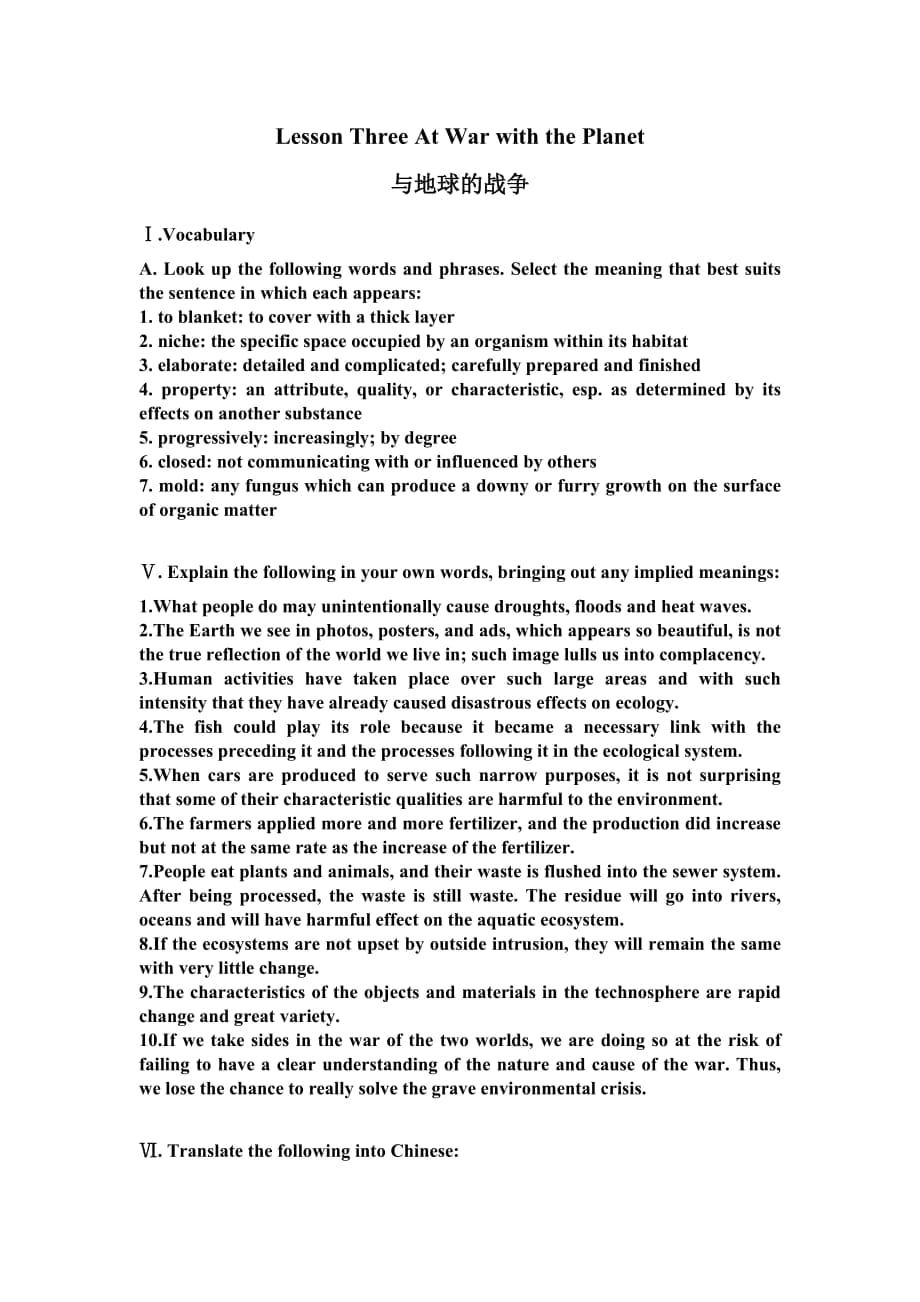《現(xiàn)代大學(xué)英語(yǔ)精讀6 課后答案 LESSON THREE》由會(huì)員分享�����,可在線閱讀�����,更多相關(guān)《現(xiàn)代大學(xué)英語(yǔ)精讀6 課后答案 LESSON THREE(2頁(yè)珍藏版)》請(qǐng)?jiān)谘b配圖網(wǎng)上搜索����。
1�、Lesson Three At War with the Planet
與地球的戰(zhàn)爭(zhēng)
Ⅰ.Vocabulary
A. Look up the following words and phrases. Select the meaning that best suits the sentence in which each appears:
1. to blanket: to cover with a thick layer
2. niche: the specific space occupied by an organism within its habitat
3. elab
2����、orate: detailed and complicated; carefully prepared and finished
4. property: an attribute, quality, or characteristic, esp. as determined by its effects on another substance
5. progressively: increasingly; by degree
6. closed: not communicating with or influenced by others
7. mold: any fungus w
3、hich can produce a downy or furry growth on the surface of organic matter
Ⅴ. Explain the following in your own words, bringing out any implied meanings:
1. What people do may unintentionally cause droughts, floods and heat waves.
2. The Earth we see in photos, posters, and ads, which appears s
4���、o beautiful, is not the true reflection of the world we live in; such image lulls us into complacency.
3. Human activities have taken place over such large areas and with such intensity that they have already caused disastrous effects on ecology.
4. The fish could play its role because it became a
5���、 necessary link with the processes preceding it and the processes following it in the ecological system.
5. When cars are produced to serve such narrow purposes, it is not surprising that some of their characteristic qualities are harmful to the environment.
6. The farmers applied more and more fe
6��、rtilizer, and the production did increase but not at the same rate as the increase of the fertilizer.
7. People eat plants and animals, and their waste is flushed into the sewer system. After being processed, the waste is still waste. The residue will go into rivers, oceans and will have harmful ef
7���、fect on the aquatic ecosystem.
8. If the ecosystems are not upset by outside intrusion, they will remain the same with very little change.
9. The characteristics of the objects and materials in the technosphere are rapid change and great variety.
10. If we take sides in the war of the two worlds,
8���、 we are doing so at the risk of failing to have a clear understanding of the nature and cause of the war. Thus, we lose the chance to really solve the grave environmental crisis.
Ⅵ. Translate the following into Chinese:
A. Phrases
1. 生態(tài)小環(huán)境以及生活在小環(huán)境中的物種
2. 寄生蟲(chóng)的棲息地
3. 魚(yú)鷹的獵食對(duì)象
4. 封閉的循環(huán)流程
5. 放射性
9、極強(qiáng)的(核)廢料
6. 經(jīng)過(guò)精細(xì)調(diào)整后的適應(yīng)能力
7. 每年加以改進(jìn)的汽車(chē)
8. 船用尼龍繩索的殘留物
9. 有毒化學(xué)物
B. Sentence
1. 我們一直在濫用這股強(qiáng)大的力量�����,就像傳說(shuō)中的魔術(shù)師的徒弟一樣���,并沒(méi)有意識(shí)到我們的這種行為很可能會(huì)導(dǎo)致災(zāi)難性的后果�����。
2. 即使全球變暖這種災(zāi)害永不發(fā)生�,即使臭氧層空洞仍然只是一種深?yuàn)W的極低現(xiàn)象,人類(lèi)活動(dòng)已極大地改變了全球條件��,這些也許是用照相機(jī)拍攝不出來(lái)的���。
3. 與生態(tài)圈相反����,技術(shù)圈是由線性流程決定的�。
4. 現(xiàn)在技術(shù)圈運(yùn)作的能源主要是礦物燃料,一旦用完���,永不再生�。
5. 尼龍不能進(jìn)行生物分解——也就是說(shuō)��,在現(xiàn)存的有機(jī)生物中還沒(méi)發(fā)現(xiàn)哪種酶可以分解尼龍��。
6. ……有生命的東西創(chuàng)造了一系列對(duì)生命至關(guān)重要的有限但獨(dú)立的物質(zhì)和反應(yīng)。
7. 免費(fèi)的午餐實(shí)際上是一種債務(wù)�����。在技術(shù)圈中��,債務(wù)是指已承認(rèn)但尚未歸還的欠款……
8. ……當(dāng)債務(wù)以技術(shù)圈制造的環(huán)境污染的形式出現(xiàn)���,然后又轉(zhuǎn)嫁到生態(tài)圈時(shí)��,這種債務(wù)將永遠(yuǎn)無(wú)法消除���。造成破壞是不可避免的。
部分文檔在網(wǎng)絡(luò)上收集�����,請(qǐng)下載后24小時(shí)內(nèi)刪除�����,不得傳播����,不得用于商業(yè)目的�����,如有侵權(quán),請(qǐng)聯(lián)系本人�����。謝謝
 現(xiàn)代大學(xué)英語(yǔ)精讀6 課后答案 LESSON THREE
現(xiàn)代大學(xué)英語(yǔ)精讀6 課后答案 LESSON THREE

